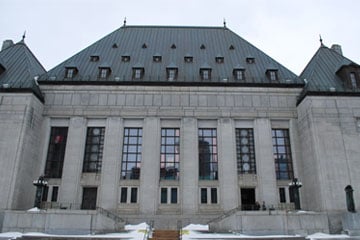The Supreme Court of Canada has ruled that two banks were liable for a $5.5-million cheque fraud carried out by a former employee of Teva Canada Ltd.

The Supreme Court of Canada has ruled that two banks were liable for a $5.5-million cheque fraud carried out by a former employee of Teva Canada Ltd.
In a 5-4 decision, the country’s top court found the major pharmaceutical company should not bear the loss resulting from the scheme, as it should fall on the two banks the employee used to carry out the fraud — TD Canada Trust and the Bank of Nova Scotia.
“To allocate losses to the drawer for having failed to identify and detect fraud is inconsistent with the strict liability tort of conversion, which makes any negligence on the part of the drawer or the banks in preventing the fraud irrelevant,” Justice Rosalie Abella wrote on behalf of the majority in Teva Canada Ltd. v. TD Canada Trust and Bank of Nova Scotia.
The scheme that spurred the dispute involved drafting false cheque requisition forms for six businesses — four using the names of company customers and two with similar names of existing customers. The former Teva employee then registered the business names as sole proprietorships and opened bank accounts for them, depositing 63 fraudulent cheques amounting to $5.5 million.
Teva then filed an action against the banks, arguing they were liable for conversion. An Ontario Superior Court judge had ruled in favour of Teva, but the Court of Appeal reversed that decision in 2016, finding the banks were not liable.
At issue in the appeal to the Supreme Court was whether the payees were fictitious within the meaning of s. 20(5) of the Bills of Exchange Act. A defence of conversion applies if cheques are made out to “fictitious or non-existing” payees.
In the majority decision, the court laid out a two-step test for how a bank must prove a payee is fictitious. The first step involves whether the drawer intends to pay the payee. If they do not, the payee is fictitious and they should not be able to recover from the bank.
If the bank is not able to prove the drawer intended to pay the payee, the second step of the test involves asking whether the payee is legitimate or whether a payee could reasonably be mistaken for a legitimate payee.
If the answer is no to both of these, the payee does not exist and the drawer is liable.
The court found that all the payees were either known customers or companies whose names could be reasonably mistaken for actual customers and, therefore, none of the payees were fictitious or non-existent and the banks could not rely on the defence in s. 20(5).
Colby Linthwaite, one of the lawyers representing Teva, says the decision clarifies the defences available under the Bills of Exchange Act.
“The majority decision by clearly stating there is a two-step test has very much clarified the state of the law,” he says. “It’s articulated in the clearest fashion yet what the law has been for some time.”
In the dissent, Justices Suzanne Côté and Malcolm Rowe wrote that a simplified and objective approach to the interpretation of the provision should be followed. The dissenting judges ruled that payees are non-existing when they do not in fact exist at the time the instrument is drawn.
“The non-existence of the payee obviously makes the endorsement by this person impossible,” Côté and Rowe wrote. “Thus such a cheque may be treated as payable to the bearer, providing the banks with a defence to the tort of conversion.”
They added that if a payee is determined to be an existing person, it should then be asked whether they are fictitious, meaning when there is not a real transaction between the drawer and the payee.
Linthwaite says if the majority had adopted the dissent, it would have represented an “enormous upheaval” in the law.
“It would have returned the law to a state that it was in for a 17-year period at the end of the 19th century,” he says.
The lawyers representing TD Canada Trust and the Bank of Nova Scotia did not provide comment before deadline.









